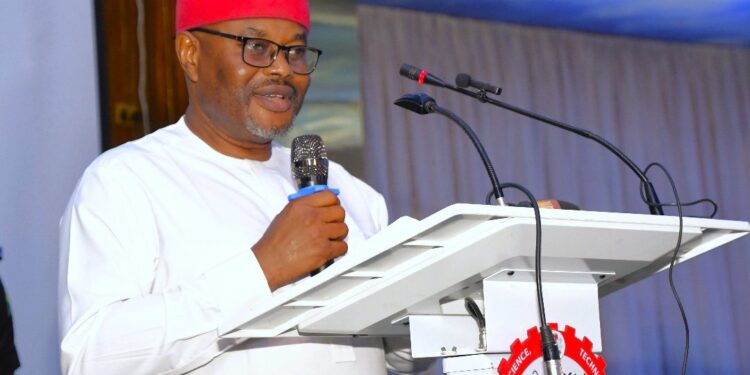The Federal Government has announced that it could generate over $200 billion annually through the regulation and licensing of space activities.
Chief Uche Nnaji, the Minister of Innovation, Science, and Technology, disclosed this during a one-day sensitisation and stakeholders engagement workshop on space regulation, spectrum management, and licensing on Tuesday in Abuja.
The workshop, which was organised by the National Space Research and Development Agency (NASRDA), marked a significant step toward shaping a competitive space industry in Nigeria.
Nnaji emphasised that the new regulations would not only help build a robust space sector but also drive Nigeria’s economic development and technological leadership.
“With this space regulation and licensing, companies such as Starlink, including DSTV, which pay peanuts for using space products and short-changing Nigerians, will be regulated and licensed.
“You can be assured that yearly, following the laid down strategies, we will be looking at realising over 200 billion dollars annually with an increment yearly of 18 to 20 per cent,” Nnaji said.
$20 billion yearly from space tech in oil sector
The minister also highlighted that President Bola Tinubu had approved the mainstreaming of space technology in revenue generation, especially in the oil and gas sector.
“This will ensure that any ship coming into this country, even when they switch off their ignition and glide in without paying bunker fees and other payments, and then head out, space technology can detect their entry for necessary payments.
“So we are looking at over 20 billion dollars yearly income through that, and that is part of the many reforms that are coming under this regulation,” the minister said.
Nnaji stated that space is no longer just for dreamers, emphasizing the goal of creating a well-regulated ecosystem that supports both public and private players and delivers tangible benefits for the people.
“Our task is to ensure a clear, regulated ecosystem where both public and private players can thrive and a space sector that drives innovation, attracts investments, and delivers real impact for our people,” he said
- He also mentioned that the Federal Government, through the National Space Council, which consists of 15 members, is working on advancing the National Space Policy to include relevant areas of modern space operations.
Space licensing and regulation
Dr. Matthew Adepoju, Director-General of NASRDA, explained that the workshop was designed to explore ways to implement the 2015 regulations on licensing and supervision of space operations, as outlined in the agency’s Act of 2010.
“These regulations provide a comprehensive framework, ensure compliance with national and international space laws, promote transparency in licensing processes, and enhance security and safety in space operations,” Adepoju said.
- He further noted that space licensing could serve as a significant revenue-generating avenue for the Nigerian government.
- By implementing a structured licensing system, the agency aims to ensure proper fees and charges for satellite launches, spectrum management, and data services, which will further commercialise space-related services and attract local and foreign investments.
Space policy review
Olisa Agbakoba, a Senior Advocate of Nigeria, discussed the need for a review of the National Space Policy, originally produced in 2000.
“Nigeria needs to domesticate the key international space treaties that we have ratified but have yet to incorporate into our policy,” Agbakoba stated.
- He highlighted the global space economy, which is projected to reach $1 trillion by 2030, and stressed the importance of Nigeria being a key player. He emphasized that Nigeria has the potential to capture a significant portion of the market, but the country needs to establish the right regulatory, legal, and institutional frameworks to do so.
- Agbakoba also referenced several crucial treaties that Nigeria must domesticate, including the Outer Space Treaty of 1967 and the Liability Convention of 1974. He pointed out that while Nigeria had ratified these treaties, they must be passed by the National Assembly to become law.
Dr. Umar Bindir, Secretary to the Adamawa State Government, stressed the importance of translating scientific knowledge into practical solutions. He also called for regulatory frameworks to align with national development agendas to foster innovation.
“We need to analyse all the historical and overlapping groups, particularly ministries, agencies, and also the database of universities, polytechnics, and colleges of education. This will enable filtering of their mandates for space-related activities to coordinate efforts,” Bindir said.
He further advocated for promoting space technology more intensively, including having exhibitions every six months to raise awareness and encourage innovation.



















